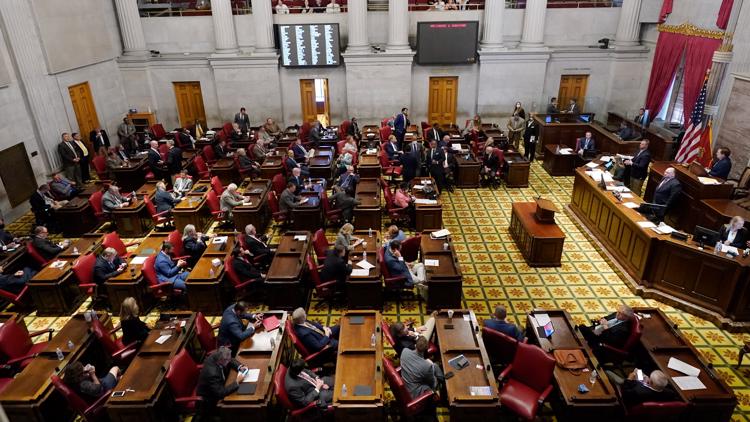NASHVILLE, Tenn. — As Tennessee lawmakers head into an annual legislative session on Tuesday, some fights are already underway — over whether the state's strict abortion ban needs exceptions, if express toll lanes and electric vehicle fee hikes can help solve roadwork needs, and how restrictive Republicans want the law to be regarding transgender youth health treatment.
Republican lawmakers enter the months-long session with supermajorities still secure after November elections under new district lines they drew. GOP Gov. Bill Lee also won reelection with ease.
Following their dominance at the ballot box, Republicans have a decision to make about the restrictive abortion law they passed in 2019 that voters of both parties in polling have widely said should have exceptions. The polling, conducted by Vanderbilt University, also found that Tennessee voters largely did not know the specifics of the current law.
Tennessee’s ban, which went into effect upon the overturning of Roe v. Wade, does not have an explicit exemption for the mother’s life. Instead, it shifts the burden to the doctor to make a case in criminal court, if charged with a felony under the law, that an abortion was needed to save the mother’s life or to spare her from irreversible, severe impairment.
House Speaker Cameron Sexton has been the most prominent Republican to call for changes to the law. He has said the burden of proof should be on prosecutors, not on doctors. He also has said he would support exceptions for rape and incest. Democrats have opposed the ban and are calling for the changes.
It's unclear whether the push for exceptions will succeed, with other Republican leaders, including Gov. Lee and Senate Speaker Randy McNally, so far resisting pleas to amend the law. The debate has already resulted in political fallout: the anti-abortion Tennessee Right to Life group withdrew its endorsement of Republican Sen. Richard Briggs after the physician called for exceptions to the law.
Republican lawmakers likely won't have as much disagreement over legislation that targets health treatment of transgender minors.
A bill drawn up by GOP House and Senate majority leaders would ban medical providers from altering a child’s hormones or performing surgeries that enable them to present as a different gender. It's among more than two dozen bills seeking to restrict transgender health care access that have been introduced across 11 states for legislative sessions beginning in early 2023.
In Tennessee, Republicans are pushing the legislation after they applied pressure to Vanderbilt University Medical Center in Nashville over gender-affirming surgeries for minors. The hospital then paused the procedures in order to review its practices.
On average, VUMC has provided five gender affirming surgeries to minors every year since its transgender clinic opened in 2018. All were over the age of 16 and had parental consent, and none received genital procedures.
Another Republican proposal takes aim at drag shows, seeking to ban them in public when children could be present. The bill has raised eyebrows over whether it would violate free speech constitutional protections.
The governor, meanwhile, has prioritized plans to pay for roadwork to combat congestion in a state that continues to see its population boom.
Lee's proposal will depend largely on expanded public-private partnerships, including new express toll lanes funded by private companies on interstates around Tennessee cities. He also has floated the tripling of the annual fee for owning an electric vehicle, from $100 to $300. Lee, however, has since said the increase may not end up at that level. A more-recent Department of Transportation presentation on the roads framework omitted the dollar amount when mentioning the electric vehicle fee increase.
His administration has also pressed for a pay hike for state transportation workers.
Pay issues could also be coming for the Tennessee Bureau of Investigation, which has lamented its ability to recruit and keep workers due to low pay. The agency has said the problem contributed to slow turnaround times on rape kits . Already, it received funding for an emergency hiring boost and a $2 million request for private lab testing after a man was charged with murder and kidnapping in the death of a jogger in Memphis. Shortly after that, he was charged in an unrelated rape because a long-delayed DNA test was finally processed on a rape kit.
Another issue lawmakers are expected to take up is addressing systemic problems inside the state's Department of Children's Services, which Democrats have long criticized. A sweeping audit released late last year found Tennessee has repeatedly failed to thoroughly investigate sexual abuse allegations in the facilities that house the state’s most vulnerable children. Lee has maintained that the state is working on solutions and he is planning a funding boost in his 2023-24 spending plan, which has not yet been made public.



